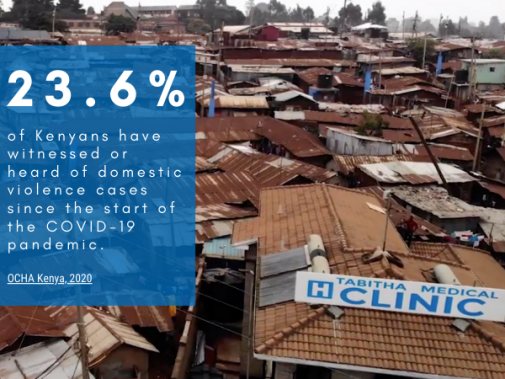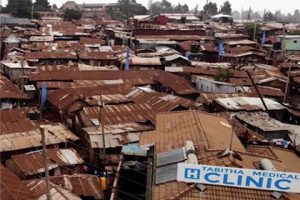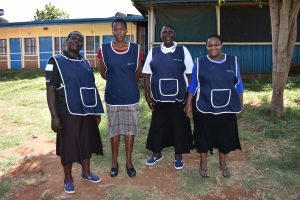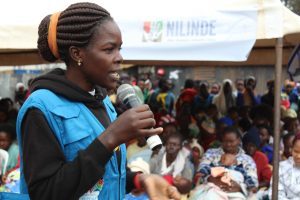The Impact of COVID-19 on SGBV in Kibera
Disclaimer: This post contains information about sexual and gender-based violence. If you feel unsafe, have been harmed, or feel threatened, intimidated, or harassed, seek support at CFK #usinyamaze toa sauti.
The World Health Organization (WHO) declared the COVID-19 outbreak a global pandemic in March 2020. As a result, countries around the world implemented various quarantine measures, economic insecurity and unemployment rates soared, and concerns surrounding domestic violence and other forms of sexual and gender-based violence (SGBV) escalated.
Fueled by a combination of confined living conditions, economic insecurity, and food insecurity, there has been an alarming increase in physical, psychological, sexual, and economic forms of domestic violence against women and girls in Kibera and across Kenya.

Since the start of the pandemic, CFK has received reports of women in Kibera being abused by their husbands due to a lack of food and power to provide for the family. Additionally, teenage pregnancies have escalated during the pandemic, and we have learned of instances of sexual assault committed by male neighbors against teenage girls.
School Closures, Food Insecurity & SGBV
Schools typically serve as ‘safe spaces’ for children in the community. Some schools also offer lunches, alleviating some of the food insecurity that many families in Kibera face. Unfortunately, due to government-mandated school closures, thousands of students cannot attend class, and many have lost access to school feeding programs.
Girls suddenly find themselves home all day, frequently with no caregivers around, and struggle to find work to provide for themselves or their families. This increased food insecurity and financial stress have forced some into unhealthy, manipulative relationships.
CFK’s Support for Survivors
CFK is committed to sensitizing the community on SGBV and supporting and achieving justice for survivors of SGBV. Our team provides critical medical care and mental health support for survivors, connects them to resources such as safe houses, and works with other local organizations to help survivors pursue legal action if they desire.
As the COVID-19 pandemic continues to exacerbate the vulnerabilities of girls and women in informal settlements, we must work together to identify, address, and end cases of SGBV.
If you or someone you know has experienced SGBV or feel at risk of SGBV, you are not alone and it is not your fault. Contact CFK for support.
Stories of Progress
 The Impact of COVID-19 on SGBV in KiberaFueled by a combination of confined living conditions, economic insecurity, and food insecurity, there has been an alarming increase in physical, psychological, sexual, and economic forms of domestic violence against women and girls in Kibera.by Carolina for Kibera
The Impact of COVID-19 on SGBV in KiberaFueled by a combination of confined living conditions, economic insecurity, and food insecurity, there has been an alarming increase in physical, psychological, sexual, and economic forms of domestic violence against women and girls in Kibera.by Carolina for Kibera
 From the Field: A Day in the Life of a Community Health VolunteerLiving in Kibera for many years, Bentado, one of the Community Health Volunteers (CHVs) working out of CFK’s Lishe Bora Mtaani Nutrition Centre, has experienced firsthand the health challenges facing the community. Now, she has become part of the solution. by Hannah Bain
From the Field: A Day in the Life of a Community Health VolunteerLiving in Kibera for many years, Bentado, one of the Community Health Volunteers (CHVs) working out of CFK’s Lishe Bora Mtaani Nutrition Centre, has experienced firsthand the health challenges facing the community. Now, she has become part of the solution. by Hannah Bain
 Working Together to Address SGBV in KiberaWorldwide, 1 in 3 women experience sexual and gender-based violence (SGBV) in their lifetime. In Kibera, that statistic is likely higher, but CFK is empowering girls, mobilizing the community, and helping create a path to justice for survivors.by Hannah BainRead more stories
Working Together to Address SGBV in KiberaWorldwide, 1 in 3 women experience sexual and gender-based violence (SGBV) in their lifetime. In Kibera, that statistic is likely higher, but CFK is empowering girls, mobilizing the community, and helping create a path to justice for survivors.by Hannah BainRead more storiesThe post The Impact of COVID-19 on SGBV in Kibera appeared first on Carolina for Kibera.
Rye Barcott's Blog
- Rye Barcott's profile
- 7 followers



